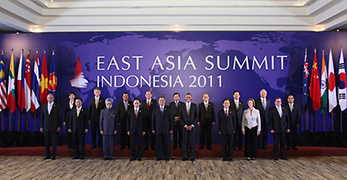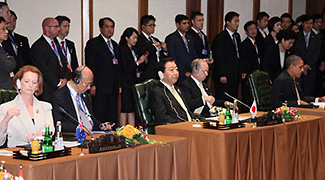Sixth East Asia Summit (Overview)
November 19, 2011

Group photograph before the East Asia Summit (EAS) Meeting
Photograph of the East Asia Summit (EAS) Meeting
(Photos: Cabinet Public Relations Office)
The Sixth East Asia Summit (EAS) was held in Bali, the Republic of Indonesia, on November 19, chaired by Indonesian President Susilo Bambang Yudhoyono. Prime Minister Yoshihiko Noda attended the meeting. The following is a summary of the Summit.
1. Review of the EAS and Future Direction
(1) Overview
Prime Minister Noda, welcoming the first participation in the EAS of the United States and the Russian Federation, stated that he wants to develop the EAS into a leaders-led forum that confirms common ideas and fundamental rules of the region through enhancement of its political and security initiatives in addition to practical cooperation promoted so far, thus connecting its outcome to tangible cooperation. Other participating countries also welcomed the U.S. and Russian participation, and spoke of the need for the EAS to further strengthen its cooperation in political and security areas.
(2) Ocean
Prime Minister Noda made a point that the ocean is public goods connecting the Asia-Pacific region and expressed Japan's understanding that the participating countries shared the importance of fundamental rules pertaining to the ocean such as peaceful dispute settlement, freedom of navigation and compliance with international law, including the U.N. Convention on the Law of the Sea.
The "Declaration of the EAS Summit on the Principles for Mutually Beneficial Relations" reaffirmed in its preamble the Leaders' commitment to recognized principles of international law, recognizing that the international law of the sea contains crucial norms contributing to the maintenance of peace and security in the region and that respect for international law and settlement of differences and disputes by peaceful means were included in the principles to guide the EAS participating countries.
Prime Minister Noda underlined the importance of having a forum where government officials and private-sector intellectuals could have a wide-ranging and free exchange of views on ways of cooperation in the ocean. Other participating countries spoke in support of his proposal, with no opposition voiced by other countries.
Some countries spoke of the importance of territorial disputes in the South China Sea being settled peacefully in accordance with international law. They welcomed the adoption of the guidelines for the implementation of "Declaration on the Conduct of Parties (DOC) in the South China Sea" at the ASEAN-China Foreign Ministers' Meeting in July and expressed their hope that they would work out a legally binding code of conduct (COC) in the future.
(3) Cooperation for Disaster Management
Prime Minister Noda said Japan wished to share with other countries the experiences and lessons learned from the Great East Japan Earthquake and to cooperate with them in making the region more resilient to natural disasters. He said Japan was ready to host an international conference on major disasters in 2012 and expressed his government's intention to hold the Third U.N. World Conference on Disaster Reduction scheduled for 2015 in Japan. The participating countries welcomed a joint proposal made by Indonesia and Australia for reinforcing cooperation in disaster management. Many countries noted that the Asia-Pacific region was a zone prone to natural disasters and stressed the need for the EAS to have solid discussions on the establishment of a system for disaster prevention, emergency relief and other relevant matters.
(4) Disarmament and Non-proliferation
Prime Minister Noda referred to the importance of intensifying disarmament and non-proliferation in East Asia and hoped for participation in the Proliferation Security Initiative (PSI) of countries not party to it. Many other countries underscored the need to enhance the non-proliferation regime.
(5) Sharing Democratic Values
Prime Minister Noda said it was significant to make full use of the Bali Democracy Forum in order to share democratic values. In this respect, he mentioned that he positively evaluated a wave of positive moves under way in Myanmar toward democratization and national reconciliation, and hoped that the country would further promote its dialogue with the international community. He added it was important for the international community to support the initiatives taken by Myanmar.
(6) Connectivity
Prime Minister Noda stressed the importance of enhancing connectivity in the entire East Asian region, including non-ASEAN member countries, and said efforts to that end should be promoted by making use of the Master Plan on ASEAN Connectivity. The EAS Leaders issued the Declaration of the Sixth East Asia Summit on ASEAN Connectivity at the end of the Summit.
(7) Economy and Trade
Prime Minister Noda expressed his hope that new working groups on the proposed East Asia Free Trade Area (EAFTA) and Comprehensive Economic Partnership in East Asia (CEPEA) would be put in place soon to accelerate the study on the liberalization of trade and investment in East Asia.
(8) Low-carbon Growth
Prime Minister Noda expressed his wish to forge a low-carbon growth model through promotion of Japan's initiative on the "East-Asia Low Carbon Growth Partnership" and called on other countries to support a plan for Japan to host an international conference under the initiative in Tokyo in April 2012. Australia spoke in support of the Japanese proposal.
(9) Others
Prime Minister Noda pointed to the importance of cooperation in energy, youth exchange, education, and science and technology, saying Japan would act positively in all of those fields. Specifically on youth exchange, he said his government, in the wake of the Great East Japan Earthquake, was considering plans to launch a new exchange program for about 10,000 youths, including those from North America, by the end of March 2013.
Many countries expressed concern about the world economy becoming unstable amid the European financial crisis and said the growth of the Asia-Pacific region was of added importance in this situation.
2. Regional and International Situations
Prime Minister Noda stated that North Korea's nuclear and missile development programs were real threats and it was necessary to press them strongly to renounce nuclear weapons, including immediately suspending its uranium enrichment activities, in accordance with the relevant U.N.Security Council resolutions. While welcoming the recent inter-Korean and the US-North Korea dialogues, and noting, at the same time, the lack of North Korea's concrete actions toward denuclearization, he stated that it was extremely important to continue to urge North Korea to make a decision so that the Six-Party Talks would make progress. He also expressed Japan's deep concern over North Korea's human rights situation, including the abduction issue. He also noted that Japan place importance on the U.N. resolution on the situation of human rights in North Korea and asked for other countries' cooperation in resolving the abduction issue.
Back to Index
